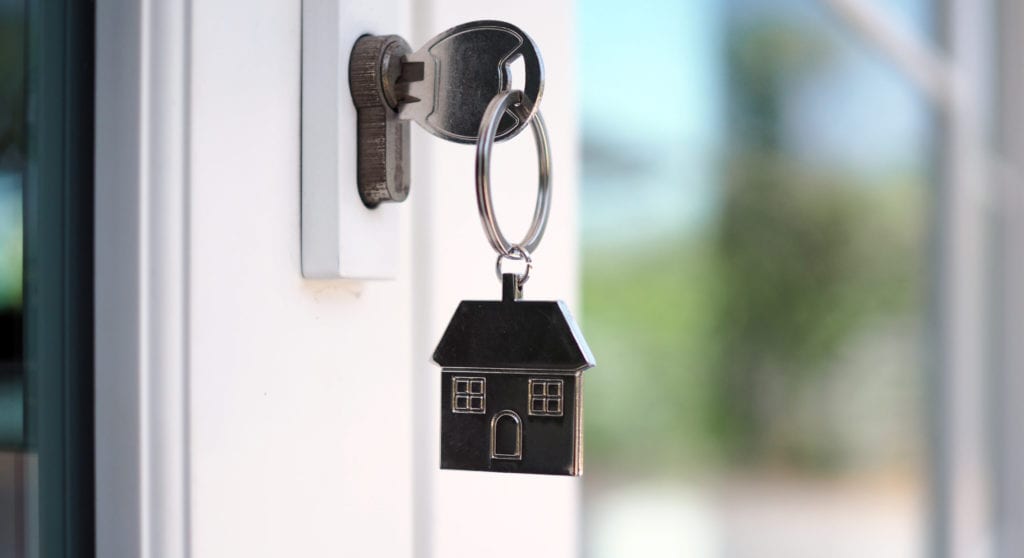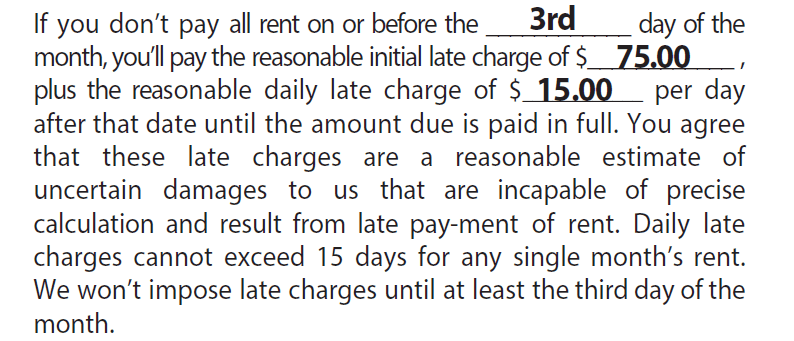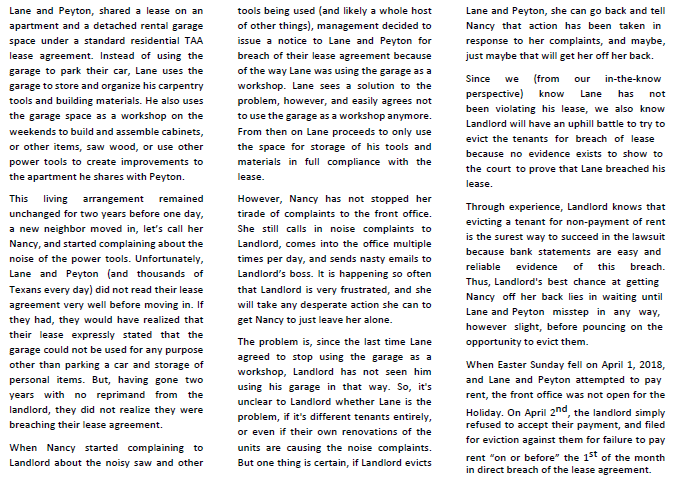The Grace Period Conundrum in Texas Residential Lease Agreements

If you’ve been a renter under a residential lease in Texas, chances are you have come across language something this:

After reading something like this in a lease agreement you are very likely to think, “OK cool, I have until the 3rd of the month to pay my rent each month without anything bad happening to me.” I get where you are coming from, I really do. You didn’t take a giant leap to get there, and it’s a pretty small step (for anyone) to see where logical reasoning has led you. It goes something like this: 1) the negative consequences that are written into your lease agreement only apply if you pay after the 3rd of each month, so 2) you have a grace period to pay rent late without being evicted. Right?
WRONG. You are in breach of contract if you pay your rent even ONE day late.
Yep, that’s how contracts work in Texas; you either meet or exceed the requirements listed, or you are likely in breach of its terms. If your lease states that your rent is due “on or before” the 1st of the month, then in order to meet the terms of the contract you need to pay rent on or before that date.
It’s extremely important for Texas tenants to realize that the Texas Property Code at §92.019 expressly grants residential tenants a grace period before late fees may be applied, but in no way, shape or form (not even for werewolves) does the law grant residential tenants a mandatory grace period to pay your actual rent. No, late fees can’t be applied, but yes, you can be evicted for breach of contract for paying rent one day late. Don’t take my word for it, check it out for yourself at Section 92.019(e). Seriously, educating yourself as a tenant is the only way to know what your rights are, and to avoid being taken advantage of by your landlord.
Sec. 92.019. LATE PAYMENT OF RENT; FEES.
(a) A landlord may not charge a tenant a late fee for failing to pay rent unless: (1) notice of the fee is included in a written lease; (2) the fee is a reasonable estimate of uncertain damages to the landlord that are incapable of precise calculation and result from late payment of rent; and (3) the rent has remained unpaid one full day after the date the rent was originally due…
(e) This section relates only to a fee, charge, or other sum of money require to be paid under the lease if rent is not paid as provided by Subsection(a)(3), and does not affect the landlord’s right to terminate the lease or take other action permitted by the lease or other law. Payment of the fee, charge, or other sum of money by a tenant does not waive the right or remedies provided by this section.
So yes, a mandatory “grace period” exists, but it’s not for late rent payment.
For one full day (soon to be two in Sept. 2019) in a residential lease (whether your lease says so or not), you can’t have late fees added to your bill. And yes, most leases grant two days instead of just one. But, that grace period only applies to when your landlord can charge you late fees; it does not create a grace period for rent payment without breach of your lease. Your landlord can evict you for non-payment of rent as per the terms of your lease by simply refusing to accept payment from you after your due date. In most leases, rents for the entire term of the lease are owed by you (subject to mitigation by the landlord), if you get evicted.
As you can see above, the statute even goes so far as to expressly exclude the creation of a grace period for late payment of rent by stating that this law only applies to fees with classifications other than “rent”, and stating that it does not affect the landlord’s right to terminate your lease. Given that leases are written in ways that make Texan tenants feel protected for these three days when they are not, the text that is missing from this statute is the most crucial information that you need to know as a renter here.
Unless your lease states differently, your landlord can evict you for paying your rent immediately after your due date, because Texas law does not grant you a grace period for paying rent late.
If we’re being realistic, not many landlords evict tenants for paying 1 or two days late. An overwhelming majority of the time the landlord just accepts your payment and moves on. This only serves to reinforce the very incorrect assumption that we can’t get evicted for doing so. By accepting your late rent, landlords waive their right to evict you that month, so you’re good to go. Unfortunately, for a few of my clients, the landlord chose to utilize this provision to evict the tenants. Let me give you what lawyers like to call a hypothetical scenario to illustrate how this can work.

This is a real case that I litigated in my firm. Unfortunately, the response from the judge in this case went something like:
I feel really bad for them, and it doesn’t seem very fair; but the lease says the tenants must pay rent “on or before” the first of the month. The Tenants failed to do so. Therefore, the landlord has the right to evict the tenant for their breach, however slight it may have been.
In the example above, the tenants did something wrong at first and got onto the landlord’s radar as a result. Even though they completely corrected their behavior, the complaints flooding into the frustrated and desperate landlord caused an emotional response. She simply wanted a reprieve from the complaining tenants. That emotional response led to evicting the tenants, instead of thinking logically about the business’ bottom line.
The logical mind vs. the emotional mind
Logically, a landlord should accept rent a day or two late in exchange for having higher revenues in the complex. Kicking out a tenant who is a day late means risking an empty unit and less revenue as a result. It also usually means court costs and attorneys fees will have to be paid. These risks do not outweigh the damage done by receiving rent a day late. Acting in the best interest of the bottom-line is probably the way the business owner would prefer. Unfortunately, it just doesn’t always happen this way.
The problem with this idea is that the owner usually isn’t the person running the business. The daily grind and problems go through your property manager each day. Expecting a completely logical business decision from this person simply doesn’t account for the human part of the equation. More often than not, I see property managers who seem to have irrational vendettas that are motivating their actions. With effort, I may find that real root cause, and be able to negotiate a better result by trying to solve that problem.
Sometimes, evictions aren’t really about you.
Evictions for late rent do happen in several different situations that have nothing to do with your personal actions too. Maybe the landlord wants to charge more rent, so he wants to evict you to get closer to market rents. Or, the landlord may be seeking to renovate the unit you live in. Their business model my be based on buying old complexes, renovating them, and then selling them for a quick profit. In this scenario, the landlord’s profit depends entirely on how much time it takes to flip and resell the property. Each day waiting to renovate your unit is another dollar down the drain.
Obviously the stability of your home, your credit rating, and your rentability have the highest level of importance to you. So, you are likely to feel extremely stressed if this is happening to you. But, learning about your rights and responsibilities under any lease agreement is a great first step in avoiding these issues.
You can’t avoid an unfortunate situation like this if you don’t know about it. You can’t know about it unless you educate yourself. So, pay your rent on or before your due date. Then share articles like these so others like you can be in-the-know as well.
If you have questions, the MacGeorge Law Firm is always here to help you in any way we can. Call us between 9am-7pm, or schedule a consultation anytime on our website!
